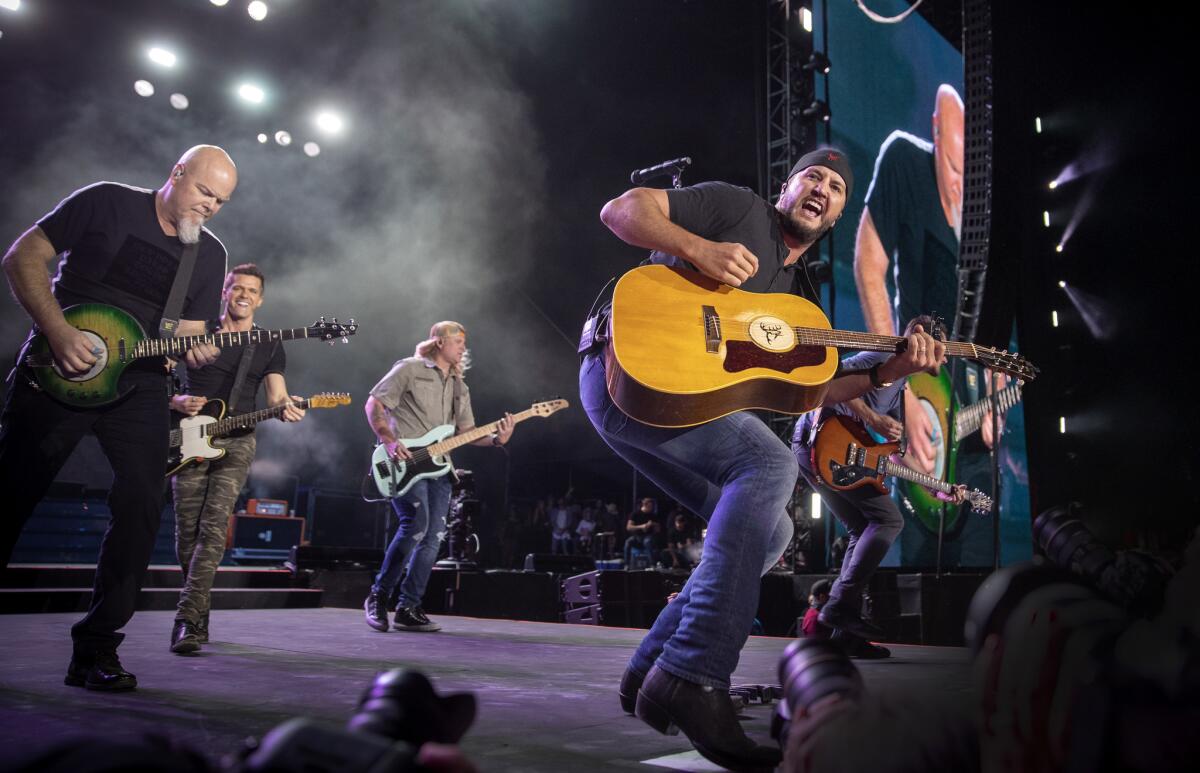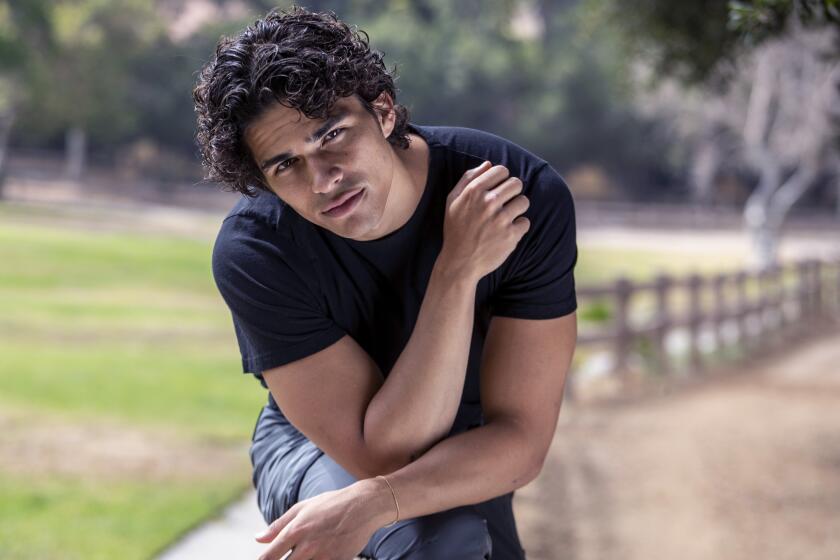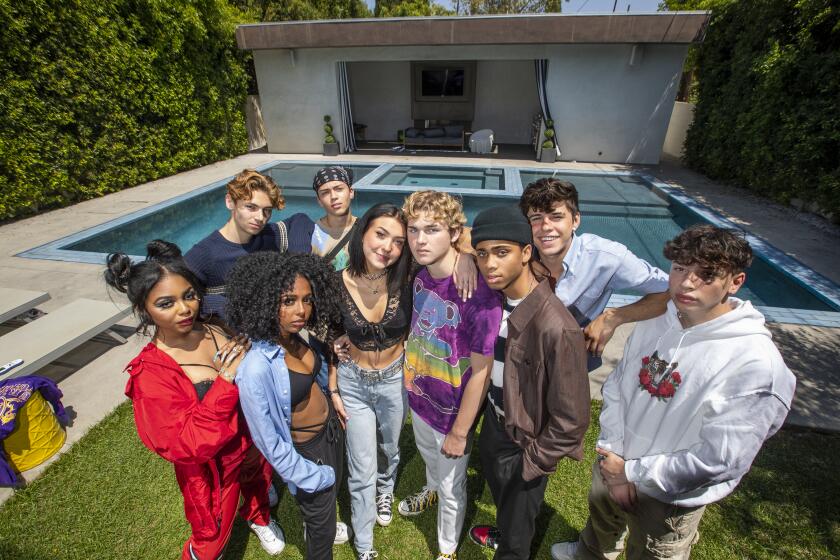Luke Bryan: ‘There’ll always be people who say I ruined country music’
This wasn’t Luke Bryan’s first rodeo.
“Am I too backlit? Hold on,” the country star said the other day as he picked up a video call at his home in Nashville. Dressed in a golf shirt and ball cap, sunglasses dangling from a cord around his neck, he stood and moved to a different part of the window-lined room.
“The problem is, if I do it this way, some of my awards get in the frame,” he said, gesturing to a wall hung with gold and platinum plaques. “And I don’t want you to think I’m so ... egotistical that I have to do Zoom calls with awards in ’em.”
After a major-label pop career went nowhere, Alex Aiono just self-released “The Gospel at 23,” a full-on gospel album that chronicles his bumpy Hollywood ride.
Bryan, 44, got accustomed to the finer points of remote technology while shooting the latest season of “American Idol,” which suddenly became an at-home production in April thanks to the COVID-19 pandemic. Now the Leesburg, Ga., native is putting his knowledge to use again as he talks up his seventh studio album, “Born Here Live Here Die Here,” his first since he joined “Idol” as a judge (alongside Katy Perry and Lionel Richie) in 2018.
Due Friday, “Born Here Live Here Die Here” lives up to its title with down-home tunes about small-town Southern life. But in songs like “What She Wants Tonight,” which rides a sleek R&B groove, the album also continues the sly expansion of country music that Bryan — perhaps the smiliest avatar of the party-hearty bro-country movement of the early 2010s — helped set into motion nearly a decade ago with “Country Girl (Shake It for Me),” his hip-hop-inflected 2011 smash.

“Thirty years ago, when you listened to Randy Travis and all that, everybody was walking down the same street. Now the street is a lot wider,” he said, with room for the adventurous likes of Sam Hunt and Lil Nas X. And despite all those accolades — he’s scored more than two dozen No. 1 singles, including the new album’s blithely unburdened “One Margarita,” and been named the Country Music Association’s entertainer of the year twice — Bryan insists he’s still interested in change.
“I remember being in college and alumni coming and going, ‘Y’all don’t party like we used to party,’” he said. “I was like, ‘God, man, you sound like a ding-dong.’ ”
Like countless other musicians, Bryan was supposed to take his latest work on the road in 2020, hitting arenas and amphitheaters as well as the open-air spaces he’s played for years on what he calls his Farm Tour. With those plans called off because of the pandemic, he recently used his tour bus for a fly-fishing trip with his two sons and his nephew, whom Bryan and his wife began raising after the deaths of the singer’s sister and brother-in-law.
“We had a big time,” he said of the trip, still looking a little sunburned, as he sipped a beer. Another silver lining of an age with no shows: “I’ve gotten to sleep next to my wife a hell of a lot this year — though I’m not sure my wife is enjoying that.”
Do you think of yourself as someone who shaped modern country music?
Let me paint the picture: I’m a small-town kid, and somehow I listened to Alan Jackson, N.W.A, the Beastie Boys, Garth Brooks and Heavy D & the Boyz. I think my generation, as far as being a country kid, was one of the first to have these forms of music really start integrating.
So the evolution was inevitable. But somebody still had to make the music.
And “Country Girl (Shake It for Me)” was born strictly for that reason. I would go play college bars, honky-tonks — a thousand people dancing, partying their ass off, spraying beer. And the second I got offstage, the DJ would play the biggest hip-hop songs in the world, and everybody wearing cowboy hats and cowboy boots and Wranglers with dip rings, they were all out there grinding and humping one another. And nobody ever had a problem with it. So “Country Girl (Shake It for Me)” kind of does all that. So does “That’s My Kind of Night.” It’s almost like a touch of a hip-hop song with a guy with a real country voice singing it.
Which now is practically unavoidable.
But I didn’t know I was gonna open up another avenue. And you know what? There’ll always be people who say I ruined country music. But I was driving home from downtown Nashville yesterday and I heard Kane Brown on pop radio with Swae Lee and Khalid. I’m like, “That’s interesting.”

What would be unexpected from Luke Bryan now?
I’m really into [the TV western series] “Yellowstone,” and the music in “Yellowstone,” it’s Texas music, cowboy music. I’m obviously not a cowboy, but it makes me wonder how I could do a really retro-sounding cowboy song that isn’t just drums, bass, guitar and steel guitar. Or when I listen to the Weeknd, that sounds like Duran Duran to me — totally an ’80s synthesizer. I’m always wondering, “What’s a fun little sound people haven’t heard me do?”
Ideologically, the country audience can be perceived by outsiders as a monolith. Do you see more diversity of thought than is often recognized?
Here’s what I know about the country audience: When you lay the right song on them, they all get it the same way. But the stereotype where everybody’s like, “Oh, write a song about guns and America and the troops and veterans, and it’ll be a hit” — I don’t view the country audience like that.
Do you feel free to speak your mind about contentious issues?
I’m always gonna walk a smart line, but I’m not scared. Look at “Most People Are Good,” a song I had a couple years ago. It touched on “Love who you love,” and that can be taken a lot of ways. I had a lot of people ask me, “Well, does that mean you want to plant a flag and support the gay and lesbian community?” I’m like, “I’m not saying I’m gonna go fly that flag — but I’m not saying I’m not either.”
That sounds pretty diplomatic.
As you get a higher profile, you do watch your words carefully. And that’s frustrating too. You oughta be able to say a lot of stuff, and if one thing is misconstrued, you oughta be able to say, “I didn’t mean it that way,” apologize and move on.
Because of the way you grew up, you’ve naturally brought elements of Black music into country. But has country gotten better at allowing in actual Black voices?
I do see it getting better. I watched Darius [Rucker]’s interview [with the “Today” show] on race, and I have sat up at night after hearing from African American audience members who say they’ve felt uncomfortable at my shows through the years. It’s a delicate conversation, and do I think we may take a little longer in country to have it? Probably. But it’s the conversation we’re having more and more.
L.A.’s TikTok creators earn thousands of dollars a month. Trump’s threat of a potential ban has them concerned.
Chris Janson and Chase Rice both faced widespread criticism recently after they played concerts with little apparent concern for social distancing. But an act on your level has to think more rigorously about how to return to the road.
You don’t want to be the sacrificial lamb. If I’ve made decisions on not doing shows, it’s because let’s see what we’re truly dealing with. We’re still learning what this virus is every day.
Have you heard good ideas about how it might be done?
It’s all out of whack. I’ve got these Farm Tour shows, where say you got a 10-by-10-square-mile field, and you put a huge stage in it and you tell everybody to stay 6 feet apart and wear a mask. I’m like, “We could make this happen where if somebody called bull— on us, we could technically go spray-paint 6-foot circumferences. But I just can’t imagine that germs aren’t getting spread.

Has doing “American Idol” changed the way you think about your music?
When these kids come in and they’re singing Billie Eilish and Bishop Briggs, I’ll get home and go do some research. But because I’ve been on “American Idol,” should I have this whole eclectic, artistic view and try to go beyond…? Maybe there’s a song out there that’ll do that one of these days. And I have some material on this album that has more of an artistic approach to it. Some people might not think that. I mean, “One Margarita” is as simple as you can get. But I knew the second I heard it that a lot of people were really gonna have fun and dance because that’s what it made me want to do.
“One Margarita” obviously has its fans. But there’s a view that now is not the time for a song so frivolous.
Listen, I’ve been doing this a long time, and you just gotta go with your gut. I don’t second-guess the timing. I chose to just put out a fun song, and I look forward to when I can perform it live. If you’re a fan of mine and you don’t like the song, don’t write me off for the rest of your life. Wait around till I put something out that’s more what you want to hear from me. That’s what I used to do with all my heroes. When George Strait put out a song that I didn’t care for, I didn’t have a platform to tell the world. I just chose not to freak out about that particular song.
What’s going through your mind when you sing “Build Me a Daddy,” which is about a little kid whose father was a soldier who died?
It’s heavy. Through the years I’ve met several Navy SEAL buddies, and I just happened to be around one of these buddies when I got the mix of that song in. Navy SEALS, these guys are programmed to not show emotion. And I played him this song and it truly broke up him up. I think about that.
Your nephew lost his dad. Do you connect the song to events in your own life?
Oh, totally. Loss is loss. You know, “Build Me a Daddy,” I didn’t go in there and do 25 vocal takes on it. I think I did four, and there were even some that my engineer was like, “Man, we really can use 95% of this vocal.” That tells me I’ve connected emotionally with the song; I’m really just channeling it.
In “Born Here Live Here Die Here,” you’re clearly singing about people you’ve known, people you grew up around—
But I’m the one that left.
Right. What’s your point of view in that song?
If you really want to break it down, I guess I could be called a hypocrite. But I think about all my friends back home; I watch them living their life, enjoying the rivers and the lake and the woods. They ask me, “What’s Manhattan like? What’s L.A. like?” But they don’t want any part of that — they just want to hear about it from me. Whether they want to call me out for leaving, I’m not really worried about that. I’m more concerned with them going, “That song is who I am.”
More to Read
The biggest entertainment stories
Get our big stories about Hollywood, film, television, music, arts, culture and more right in your inbox as soon as they publish.
You may occasionally receive promotional content from the Los Angeles Times.













